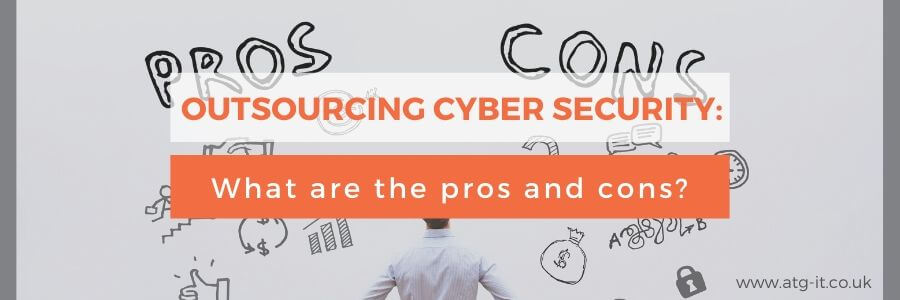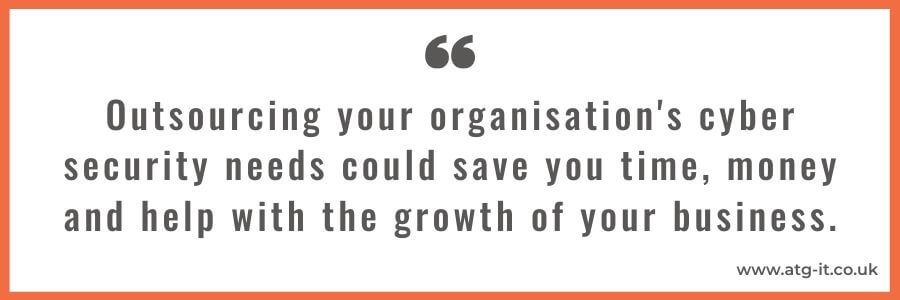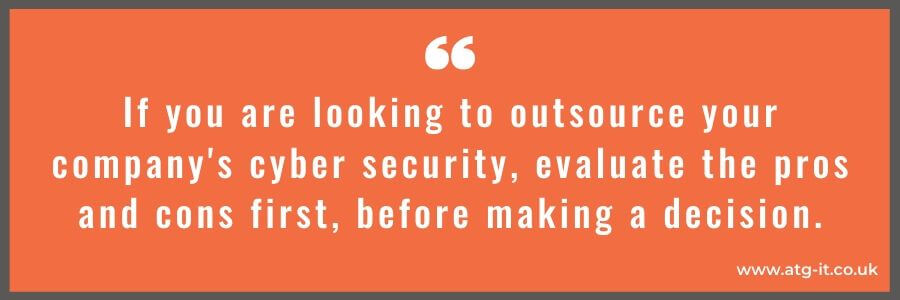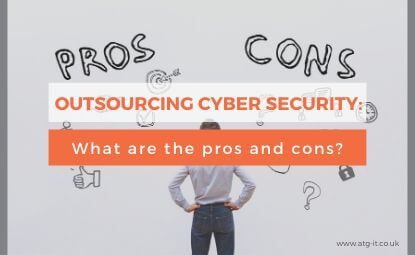
We’ve already looked at the need for businesses to invest in cyber security, to protect their data and to protect against criminals compromising servers or stealing sensitive information.
And while you can do this yourself, you may decide that you want to outsource your cyber security to a third party.
To help you make the right decision, here are some of the pros and cons of doing so...
Pros
1. Saves you time
When you’re running a business, dealing with staff, clients and suppliers, you don’t always have the time to worry about things like cyber security. Even researching the best option for your company can be time-consuming, and you will want to have a solution in place quickly and then be able to forget about it.
If you’re a small business, you’re even more likely to need to focus on work and marketing rather than cyber security. You probably won’t have the knowledge required to update and maintain your systems, so why not outsource to someone who can do it for you?
Even if you already have an internal IT department, you might prefer to have them focus on the day-to-day needs of the organisation, and get them to liaise with a third-party support provider. That way, you can have any problems dealt with immediately and by the best person for the job.
2. Expertise
An external IT company will have a range of cyber security solutions available and will be able to advise you on exactly what’s right for your business. They’ll be aware of the latest developments in malware, hacking and phishing, and will proactively work to protect your systems.
They will also be able to set up your security for you, either remotely or by visiting your premises. They will offer staff training so everyone knows how to use the system, and will advise on things like data backup and restore, password protection and other security measures that you can implement to make your data even safer.
3. 24/7 Protection
Cyber criminals don’t only work during office hours. They can be based anywhere in the world, so operate in a different time zone, and are more likely to attack your servers at night, weekends or over the holidays because you’re more vulnerable at those times.
A third-party IT partner should offer 24/7 monitoring and response as standard. This means that they can spot potential threats and, wherever possible, deal with them before they do any damage. They can also make any fixes required if a breach does happen, and ensure that your business continues to run as normal.

4. Professionalism
Deciding to invest in a cyber security provider will make your business look more professional in your industry. It shows you’re up to date with the latest potential risks and demonstrates that you’re taking steps to keep your data safe, as well as that of your customers and partners.
The General Data Protection Regulation (GDPR), introduced in mid-2018, gives business owners the responsibility of looking after third-party data. It’s expected that any information you hold on an individual or company is secure, and any data compromise also means you are in breach of the legislation.
5. Business growth
Compliance with GDPR legislation demonstrates to larger companies and potential clients that you understand the risks of cyber crime and are protecting yourself. Having a security solution in place encourages those organisations, particularly if they’re public sector, to choose you as a supplier or partner over your competitors.
This is particularly helpful if you’re looking to grow because smaller companies are usually more vulnerable to data breaches and compromises. By outsourcing your security, you’re protecting your business both now and in the future.
If the worst happens and your business is targeted, there is an immediate financial cost. The longer it takes you to put things right, the more money you may lose. It’s not uncommon for a company that’s suffered a breach to ultimately go bust, because the restore and repair costs are too great for them to recover from.
Cons
1. Investment costs
One of the biggest barriers to businesses when it comes to investing in any kind of technology is the cost.
There is, of course, the upfront cost of having the solution implemented into your business, as well as the cost of potential downtime while every device is updated. There is also the ongoing maintenance cost, particularly if you choose a system with 24/7 monitoring and fast responses.
However, the cost of a data breach will be far greater than what you’re paying to your IT partner, and the regular payments should mitigate the need for having to call someone out to fix any problems. We’ve seen what the potential long-term damage could be without cyber security in place.
2. Improvement costs
As cyber criminals become more sophisticated, they find new, unexpected ways to target your systems. This may result in you needing to invest in additional protection or software, or upgrade your security solution. You may not get a lot of warning about when these costs will arise.
Furthermore, if you’re running Windows on your devices, you might have to upgrade this – Windows 7 EOL (End of Life) was brought in in January this year, meaning Microsoft will no longer update its security.
Likewise, Windows 8 will soon be phased out. The cost of replacing your operating system will be unavoidable, so it makes sense to invest in a security solution as well, to keep yourself as safe as possible and to minimise the risk of having to pay for data recovery.

3. Reliability
You may be worried that a cyber security solution isn’t up to the right standard for your business needs, or it won’t protect everything adequately. You may also be concerned that you’re paying for constant monitoring but that might not actually happen when you’re out of the office, or that the system might fail.
First of all, identify your priorities – if something went wrong, which devices or areas of the server need to be protected first? Then, look at the various cyber security solutions out there. Ask for recommendations from friends, trusted colleagues and your IT team if you have one, and finally, speak to at least three providers about how they can help you.
4. Small business
Smaller companies have enough costs without having to pay for things like cyber security. If there’s only you or you have a small team, work with a few clients or don’t have a lot of equipment, then you may think you don't need cyber security.
While you will probably not need to invest in a comprehensive solution, you DO need to protect what you have.
If you’re using cloud storage for backup and a way of saving money, that needs to be protected. Public cloud solutions are particularly vulnerable, so make sure that if yours is compromised, your data stays safe. And you’re probably planning to grow your business at some stage, so having security in place now will make that easier.
5. Not an industry requirement
If you don’t work in a regulated industry, you may not be required to invest in or demonstrate that you have a cyber security solution. You may feel that you can manage with free protection, or that criminals are unlikely to target your field. Perhaps your competitors don’t bother with security, so you don’t see the need.
While not paying for security may save you money in the short term, there is always the possibility that your industry’s ruling body, or even the government, may decide to make cyber security a requirement.
Not having it may result in fines or not being accredited, and having to implement a solution at short notice may be costly and slow. Take the opportunity to invest now, because as we’ve said, it will make you look more professional and help future business growth.
If you would like to discuss outsourcing your cyber security, our knowledgeable team are on hand to answer any questions you might have. Why not give them a call today?


You must be logged in to post a comment.